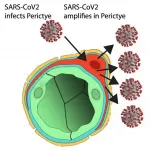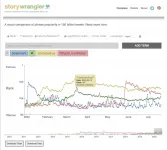Washington, DC (July 16, 2021) -- Studies have shown that diabetes drugs called sodium-glucose co-transporter 2 (SGLT2) inhibitors can provide kidney- and cardiovascular-related benefits to individuals with or without diabetes and with or without impaired kidney function. An analysis appearing in an upcoming issue of JASN now provides insights about the efficacy and safety of SGLT2 inhibitors in people with advanced chronic kidney disease (CKD), an especially vulnerable population.
For the analysis, Glenn M. Chertow, MD, MPH (Stanford University School of Medicine) and his colleagues examined data from the Dapagliflozin And Prevention of Adverse Outcomes in Chronic Kidney Disease (DAPA-CKD) trial, which enrolled patients with and without type 2 diabetes and with mildly decreased to severely decreased kidney function (stage 4 CKD).
In DAPA-CKD, 624 of 4,304 (14%) patients had stage 4 CKD--with an estimated glomerular filtration rate (eGFR), a measure of kidney function, as low as 25 mL/min/1.73m2--at the start of the study. Patients were randomized to receive daily treatments of the SGLT2 inhibitor dapagliflozin or placebo. Among patients with stage 4 CKD, those randomized to dapagliflozin experienced a 27% reduction in the primary endpoint (a composite of a sustained and large decline in kidney function, kidney failure, or death) and 29%, 17%, and 32% reductions in the kidney, cardiovascular, and mortality endpoints, respectively, compared with those randomized to placebo. Rates of serious side effects were similar in the two groups.
"This analysis shows that the effects of dapagliflozin in patients with stage 4 CKD are similar to effects in patients with mild to moderate CKD," said Dr. Chertow. "While patients with screening eGFR as low as 25 mL/min/1.73m2 were enrolled, it is noteworthy that neither dapagliflozin nor placebo were discontinued when eGFR declined, even to below 15 mL/min/1.73m2. Therefore, a drug initially developed for the treatment of diabetes can benefit patients with CKD with and without diabetes, including patients with moderate to advanced CKD."
INFORMATION:
Study co-authors include Priya Vart, Niels Jongs, Robert D. Toto, Jose Luis Gorriz, Fan Fan Hou, John J. V. McMurray, Ricardo Correa-Rotter, Peter Rossing, C. David Sjöström, Bergur V. Stefánsson, Anna Maria Langkilde, David C. Wheeler, and Hiddo J. L. Heerspink.
Disclosures: G.M.C. has received fees from AstraZeneca for the DAPA-CKD trial steering committee, research grants from NIDDK, and Amgen; he is on the board of directors for Satellite Healthcare, has received fees for advisory boards for Ardelyx, Baxter, CloudCath, Cricket, DiaMedica, Durect, DxNow, Outset, and Reata; and holds stock options for Ardelyx, CloudCath, Durect, DxNow, and Outset; has received fees from Akebia, Gilead, Sanifit and Vertex for trial steering committees; and has received fees for DSMB service from Angion, Bayer and ReCor. P.V. and N.J. have no conflicts of interest to declare. R.D.T. has received support from AstraZeneca as a member of the executive committee for DAPA-CKD; is a consultant for Boehringer-Ingelheim; has participated on advisory boards for Bayer, and Relypsa; served on data monitoring committees for Akebia and Reata Pharmaceuticals; executive committee for Amgen; and as a faculty associate for Quest Diagnostics. J.L.G. has received honoraria for lectures AstraZeneca, Mundipharma, Eli Lilly and Novo Nordisk; and for advisory boards from AstraZeneca, Boehringer Ingelheim, Mundipharma and MSD. F.F.H. has received honoraria from AstraZeneca as a member of the executive member of the DAPA-CKD study; received honoraria from AbbVie for participation in a steering committee. J.J.V.M. has received support to his institution, Glasgow University, for work on clinical trials, consulting and other activities: Abbvie, Alnylam, Amgen, AstraZeneca, Bayer, BMS, Cardurion, Cyclerion, Cytokinetics, DalCor, GSK, Kidney Research UK, Merck, Novartis, Pfizer, Servier, Theracos. Vifor- Fresenius. He has received personal lecture fees: Abbott, Hickman, Sun Pharmaceuticals and Servier. R.C-R. has received fees from AstraZeneca for the DAPA-CKD trial steering committee; speaker fees from Boehringer Ingelheim, Amgen, and Janssen; research support from GlaxoSmithKline and Novo Nordisk; honoraria for advisory boards from Boehringer Ingelheim, Novo Nordisk and Medtronic. P.R. has received fees to his institution for research support from AstraZeneca and Novo Nordisk; for steering group participation from AstraZeneca, Gilead, Novo Nordisk, and Bayer; for lectures from Bayer, Eli Lilly and Novo Nordisk; and for advisory boards from Sanofi and Boehringer Ingelheim. C.D.S., B.V.S. and A.M.L. are employees and stockholders of AstraZeneca. D.C.W. provides ongoing consultancy services to AstraZeneca and has received honoraria and/or consultancy fees from Amgen, Astellas, Boehringer Ingelheim, Bayer, GlaxoSmithKline, Janssen, Napp, Mundipharma, Merck Sharp and Dohme, Reata, Tricida, and Vifor Fresenius. H.J.L.H. has received support from AstraZeneca to his institution for the DAPA-CKD trial; fees to his institution for his participation in advisory boards for Merck, Mitsubishi Tanabe, Janssen, and Mundipharma; as a consultant for AbbVie, Retrophin, Boehringer Ingelheim, and Novo Nordisk; for participation in steering committees for Janssen, Gilead, Bayer, Chinook, and CSL Pharma; and research support from AbbVie, AstraZeneca, Boehringer Ingelheim and Janssen.
The article, titled "Effects of Dapagliflozin in Stage 4 Chronic Kidney Disease," will appear online at http://jasn.asnjournals.org/ on July 16, 2021, doi: 10.1681/ASN.2021020167.
The content of this article does not reflect the views or opinions of The American Society of Nephrology (ASN). Responsibility for the information and views expressed therein lies entirely with the authors. ASN does not offer medical advice. All content in ASN publications is for informational purposes only, and is not intended to cover all possible uses, directions, precautions, drug interactions, or adverse effects. This content should not be used during a medical emergency or for the diagnosis or treatment of any medical condition. Please consult your doctor or other qualified health care provider if you have any questions about a medical condition, or before taking any drug, changing your diet or commencing or discontinuing any course of treatment. Do not ignore or delay obtaining professional medical advice because of information accessed through ASN. Call 911 or your doctor for all medical emergencies.
Since 1966, ASN has been leading the fight to prevent, treat, and cure kidney diseases throughout the world by educating health professionals and scientists, advancing research and innovation, communicating new knowledge, and advocating for the highest quality care for patients. ASN has more than 21,000 members representing 131 countries. For more information, visit http://www.asn-online.org.




